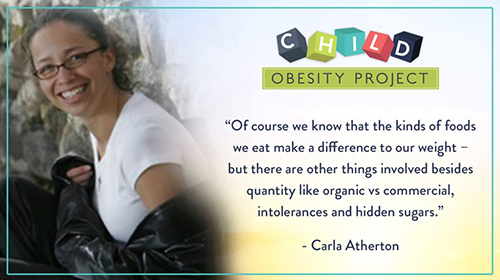When I was approached by David White, host of the Child Obesity Project, to be a speaker for his online summit, I thought, hell-yeah, and jumped at the chance. Not only did David and I become fast friends, but his mission seemed to evolve before my eyes as he got deeper into the project and revealed more about his own journey as having once been a heavy kid, how it affected him, and how he overcame his health challenges and transformed himself into the handsome, healthy young man you see today.
Childhood obesity is a topic that is on my mind quite a lot these days. I look around me and see a lot of children and teens who struggle with their weight or who don’t even realize that those extra pounds may be harming their health: mental, emotional, and physical.
In thousands of studies, obesity has been proven to be a major contributing factor in a myriad of health issues such as diabetes, heart disease, depression and anxiety, the list goes on… Also, when one is overweight, moving, playing, and everyday activities are harder to perform and leads to further discontent. When we are carrying around extra weight, we just don’t feel so up to doing the things that enrich our lives and expand our experience. And that just sucks when you are a kid.
Now, as a decently educated woman who has spent a lot of time hanging around in academic circles studying and postulating and researching media, sexism, gender roles and stereotypes, and as a woman who believes in the beauty of the individual and the fact that we humans come in all shapes and sizes, I wanted to let this concern go. I wanted to believe that it was enough to emphasize that these kiddos are indeed beautiful in their own ways and that some kids are just bigger than others, and that is OK.
And of course it’s OK! There is no way I would want any child or teen to feel badly about their weight or how they look in any way! But what concerns me is that we are seeing more and more young people struggling with their weight in epidemic numbers, and this indicates that there is a real problem here, not just affecting self-image but also physical health.
In addition to those celebratory thoughts about the individual child, I also wonder how we can optimize their individual health, as well. I wonder how necessary it is for these kiddos to feel sluggish or heavy or not at home in their bodies, because let’s face it, being overweight is difficult as it is, and when you are a child with a developing brain, delicate immature emotional skills, wonky hormones, and who is inundated with the absolute crap they are exposed to in the media about fitting in with peers, looking good, being popular, or measuring up to the stereotypes of femininity or masculinity, you have a recipe for disaster. Or at least a recipe for an unhappy child or one that perseveres but with many obstacles that may not need to be there in the first place.
Our society has developed this strange belief that there are only certain foods are kid foods, that their kids will only eat these foods, and that to eat well is to deprive these kids of their childhood pleasures. But ill health is really what will rob them. Sitting on the couch eating chips will rob them. Grabbing an apple and running outside to play or to the skatepark or to the swim meet seems to be the definition of a healthy childhood to me.
What on earth happened?
Convenience, fast-paced lives, and the degradation of the family meal (whether that be mom, dad, and kids; or mom, mom and kids; or auntie and nephew; or dad and kids; whatever your family looks like) have all led our kids to be less connected to family, to themselves, and to their bodies. You simply cannot connect, understand, explore, or listen if you are running too fast and not taking the time to stop.
Through technological advances, we have created phenomenal tools that most people on our planet have at our disposal, but we have to use them as tools and not become a slave to them. We have to ask ourselves the question: “is this serving me, or am I using this technology as a crutch?” and we need to teach our children to ask themselves the same question. If everyone is at the table texting each other or their friends or colleagues at work, or if your child is up in his/her room playing Minecraft for hours at a time on a glorious summer day, then maybe we need to have a look at creating some healthy boundaries around the technology we use and go on a media diet.
Another major concern contributing to problems of obesity in our children are the toxins and chemicals they are exposed to on a daily basis, whether those chemicals enter their bodies by way of environmental pollutants through spraying crops, inorganic food, off-gassing building supplies, carpets or plastics, personal care products, household cleaners, the list goes on. Medications are an extra burden some kids have to process through their young, developing bodies, and the toxins bugs, parasites, and viruses leave behind are also a contributing factor.
And we couldn’t come away from this conversation without addressing food. Our kids, well, our society, in general, is overfed and undernourished. We eat too much food because we never feel satisfied because the food we do eat tends to be devoid of nutrition. Our soil is depleted of the essential minerals and nutrients it once had, and what we can grow has less nutrients than it had years ago. We buy “food products” that are full of chemicals instead of cooking from scratch because everything is just going so fast in this modern life. We are all just doing our best to get something into our kids that we can afford and have time to provide. We also don’t always know what is in the food we eat or even take the time to find out. Pop and chips and fried food and high sugar condiments abound at birthday parties and school cafeterias, and this has become the norm for our children. We are literally starving, while eating ourselves to death by putting products onto our dinner tables instead of real, whole food.
Changing all of this is not easy, especially when we feel maxed out and overworked as it is. But all is not lost!
So, how can we help our kiddos who are struggling with their weight?
Teach them to eat well
Redefine the concept of “the treat” and emphasize the fact that their bodies are not garbage cans. If there is only junk food on the children’s menu, order from the adult menu. If there is only cake and cookies at the party, feed them before you go to minimize the temptation. Take them with you when you grocery shop so they can read labels, help chose the family food, and become educated about what to buy and why. Get them involved and inspired by what they learn about their health because if they don’t understand or care, then the second you turn your back they will be eating that chocolate bar they had hidden in their backpack! If you go to a potluck, bring yummy, healthful food. Be the change, and let your kids see that.
Love the crap out of them
When a child is satiated, they are less likely to fill any holes with junk, bad relationships, false senses of self-esteem (like being popular or skinny to gain outside approval), make-up, and addictions (yep! even young kids can develop addictions, especially to electronics and food). You can’t give your children everything they need as they will also want the love of their peers and other family members, but if they know that you are there no matter what, and if you give them the time to feel that love, they will have a much better time of dealing with whatever they face in the world. I know that all of you parents know this and do your best every day, but I thought that if it is something I need to remind myself of when I get busy and my kids are asking for my attention or when I get grumpy and frustrated with them without connecting to find out why they are acting the way they are, you might appreciate a reminder every now and then, as well.
Go on a media/technology diet (like, yesterday!)
Seriously?! How many hours do we need to spend in a virtual world?! Yes, some of the games are fun and we are now living in a time and space where working on the computer or connecting by cell phone is inevitable, but this is all the more reason to consciously reduce the amount of time we let our children spend on their devices and phones. Our kids will be much more likely to move their bodies, gather with friends doing activities, and, well, just living their lives, if they are not constantly distracted by those blinking lights or beeping texts or filling up their emotional holes with those distractions. We know that depression, anxiety, and apathy go hand in hand with weight problems because either the weight causes emotional, hormonal, and chemical disruption or this emotional, hormonal, and chemical disruption causes the weight problems. Whether it is the chicken or the egg, technology plays a BIG part in the health (or ill health) of our kids.
De-stress and slow down
Stress is the root of all illness. No matter who you ask who knows anything about root causes and whole health, they will tell you this. The need to slow down and give yourselves and children the time needed to think and connect and communicate is paramount and essential, not only for healing but for prevention, as well as maintaining good health. If your kids are always in fight or flight mode, they are never able to properly digest food, rest and recover with a good night’s sleep, or give their brains and minds a break from the swiftly moving world around them.
Lead by example
Isn’t this always the ultimate advice given to parents about how to help our children develop healthy habits and to become the strong, happy, capable people we want them to be? I am not telling you anything new here. BUT I am telling you that this is the best advice out there and the most crucial. None of what I have said above or any of the wise teachings of the health experts, the spiritual gurus, the teachers and researchers and doctors and practitioners and psychologists and parenting experts will tell you to teach your kids will make any impact on them if you don’t do it yourself.
So, as I said at the beginning of this article, at one point in my life, I thought that kids who had weight issues were predisposed to being overweight. But with explosion of the study of epigenetics combined with my deepened understanding of bioindividuality and functional health, I now see that their fates are not sealed. Yes, let’s embrace every one of those kids for who they are; celebrate them. Love them, teach them, spend time with them, and give them the tools to be as healthy, happy, and vital as they can be!
Many of our speakers for the first and second Biannual Children’s and Teen Health Summit have discussed these issues in further detail. Support the Children’s and Teen Health (R)evolution by purchasing the past events, and check out the talks by Emily Roberts, Brenda Wollenberg, and others about this very topic!

